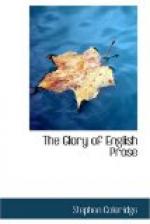Your loving old
G.P.
22
MY DEAR ANTONY,
This letter, like the last one, is concerned with war. War brings to every man not incapacitated by age or physical defects the call of his country to fight, and if need be to die, for it. It also exposes to view the few pusillanimous young men who are satisfied to enjoy protection from the horrors of invasion and the priceless boon of personal freedom, secured to them by the self-sacrifice and valour of others, while they themselves remain snugly at home and talk of their consciences.
Patriotism such as that which in 1914 led the flower of our race to flock in countless thousands to the standards and be enrolled for battle in defence of
“This precious stone set in the
silver sea,”
“This blessed plot, this earth,
this realm, this England,”
being without doubt or cavil one of the noblest emotions of the human heart, has often been the begetter of inspired prose. Our own great war has not yet produced many fine utterances, and I go back to-day to a contemporary of Sir William Napier for one of the noblest outbursts of eloquence expressive of a burning patriotism that has ever been poured forth.
Someone in the days when Wellington was alive had alluded in the House of Lords to the Irish as “aliens,” and Richard Sheil, rising in the House of Commons, lifted up his voice for his country in an impassioned flight of generous eloquence.
Sir Henry Hardinge, who had been at the battle of Waterloo, happened to be seated opposite to Sheil in the House, and to him Sheil appealed with the deepest emotion to support him in his vindication of his country’s valour. None will in these days deny that our fellow-citizens of Ireland who went to the war displayed a courage as firm and invincible as our own:—
“The Duke of Wellington is not, I am inclined to believe, a man of excitable temperament. His mind is of a cast too martial to be easily moved; but, notwithstanding his habitual inflexibility, I cannot help thinking, that when he heard his countrymen (for we are his countrymen) designated by a phrase so offensive he ought to have recalled the many fields of fight in which we have been contributors to his renown. Yes, the battles, sieges, fortunes, that he has passed ought to have brought back upon him, that from the earliest achievement in which he displayed that military genius which has placed him foremost in the annals of modern warfare, down to that last and surpassing combat which has made his name imperishable, the Irish soldiers, with whom our armies are filled, were the inseparable auxiliaries to his glory.
“Whose were the athletic arms that drove their bayonets at Vimiera through those phalanxes that never reeled in the shock of war before? What desperate valour climbed the steeps and filled the moats at Badajos! All! all his victories




